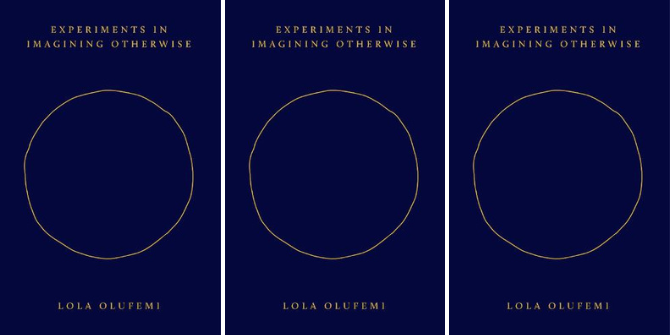In Experiments in Imagining Otherwise, Lola Olufemi offers an experimental exploration of the possibility of living differently, grounded in Black feminist thought and political organising. This generative and poetic book shows how the imagination is central to revolutionary movements as an active and collective practice that can redo the glues that bind our communities and transform our modes of relating, writes Avani Ashtekar.
If you are interested in this book, you can listen to a podcast of author Lola Olufemi in conversation with Iman Mersal, Mai Taha and Sara Salem as part of the LSE Festival 2022 event, ‘On Writing, Motherhood and Care’, recorded at LSE on 13 June 2022.
Experiments in Imagining Otherwise. Lola Olufemi. Hajar Press. 2021.
when i am walking toward the light, in the arms of
those i love
i think i touch some place that is not here.
i think i squint & i can see it.
i see its shape as warm air envelops me.
i go to write another thing about TEMPORAL REGIMES.
all my friends in struggle say
…
ffs, stop looking over there,
the light is within us!
With my teeth chattering in the brutal winds that funnelled through central London’s tall buildings, I found myself in a group huddled together around Lola Olufemi reading aloud her poetic prose STRIKE! from her bold book, Experiments in Imagining Otherwise. In his writing about strikes, Michel-Rolph Trouillot notes that ‘what history is changes with time and place, or better said, history reveals itself only through the production of certain narratives’. Olufemi’s playful writing does precisely this: it shows how moments are constitutive of, and can reveal, the capaciousness of feelings that can disrupt the chronological narrative arc of life. How the so-called past, present and future are enmeshed, only seemingly separable, but always already collapsing into one another.
In a moment in time that many have categorised as a ‘crisis of imagination’, Olufemi heralds a generative vision that nudges the reader to rethink temporality through affect. Hers, then, is a necessary intervention that binds an unflinching commitment to Black feminist and anti-colonial thought to remind us that ‘the imagination is central to the cultural production of revolutionary movements’. Indeed, the thing with time is that it can only become the stuff of memory after one has experienced it. In a tender fashion, Olufemi’s writing confronts and wrestles with this preoccupation with time to go beyond the experiential and into the experimental. She situates experience in the ambit of all things felt. Time, on her book’s pages, does not pass; rather, it spills. Like affect, it is fluid. What is Olufemi trying to tell us?

By invoking a multitude of sights and sites apart from the strike, Experiments in Imagining Otherwise foregrounds entanglements between temporal landscapes to disrupt the account of colonial modernity that forecloses potential futures and even potential histories. Her book, however, is not didactic. Treading on paths etched by Black feminists, Olufemi refuses singularity by privileging the multilayered conditions that shape the political and affective dilemmas we encounter. Taking subjectivity as her point of departure, Olufemi’s call to think and to be otherwise unfolds as a form of re-working how we engage with one another. This aligns her with a genealogy of abolitionist thought alongside Assata Shakur and Ruth Wilson Gilmore.
From the beginning of the book, Olufemi’s insistence on indulging imagination in ‘non-fiction’ thinking and writing is refreshing for it makes the subjective realm – the imaginary – a space for theorising and engaging in a collective political praxis. Remarkably, it is her disavowal of boundaries in writing and imagining that yields a fluidity to the form. This makes the task of summarising Experiments in Imagining Otherwise next to impossible – nay, undesirable. For it is the very rejection of boundaries – of structure, discipline, typography and spacing – that makes reading Experiments in Imagining Otherwise a highly experiential and joyful experience. For this reason, this review thinks through the modes through which Olufemi disrupts boundary-making to cultivate a space from which she provokes the question: how might we live (and, indeed, die) differently if we agree that we owe something to one another?
From the first page, Experiments in Imagining Otherwise invokes a welcome discomfort: no table of contents and no definitive chapter headings. Instead, an introduction is replaced by a curated playlist. Immediately after the playlist and at the end of her ‘note on language’, Olufemi asks that the reader ‘substitute the otherwise for that thing that keeps you alive or the ferocity with which you detest this world’. Her words leap out of the page as an invitation to us, its reader. As the reader substitutes ‘otherwise’ with something else, anything else, we become co-authors of the book. The book is written and rewritten through that which one imagines to be their ‘otherwise’. As such, the otherwise is not a pre-determined entity. Rather, it is a cluster of open-ended possibilities. Vitally though, it is Olufemi’s ability to constantly remind us that imagination is not an individual act – as neoliberalism preaches; instead, it ought to be a collective endeavour.
As we flip through the pages, the variation in spacing is visually stimulating and maintains surprise. However, it is through Olufemi’s meditation on language – both as a tool and method – that we discover the fatality of language and why it may be valuable to play with it. In ‘The Linguistic Loop’, Olufemi admits that ‘it can go on and on like this for many years’ as she ends her verse.
As the reader continues their journey in the collective imagination, one begins to see how singularising the self has damaged how we remember. Olufemi foregrounds this by questioning the methods that underlie the formation of the archive. In ‘She Kept Making Yesterday Tomorrow’, a certain Fanta ‘longed to know history’s gossip. The archive couldn’t tell you who loved and who was left heartbroken, who became comrades on the off chance, who found each other out of necessity. All the little details were erased in the construction of HISTORY.’ Without explicitly pointing to the constructors of History, we know that the officially endorsed, dusty pages stacked in the library tell incomplete stories.
Conventional archives are necessarily the basis through which histories are told and retold. Yet, Olufemi counters this impulse. She is at her best when she is engaging in the fugitive exercise of writing against the conventional archive. When she writes in ‘Narrative Consistency’ that ‘the image is a dead-end because it implies an archive’, that it is ‘colonial invention’, we are tasked with asking ourselves: how do we counter-archive? And what are the different modes of doing so? Here, Olufemi yet again wishes to wreck boundaries that define the archive of History. Her ardent appeal for what we may call counter-archiving is soothing like an antidote, not only because it is a way of remembering the so-called ‘past’ but also of conjuring a future on-its-way. One whose contours can only become sharper through imagining otherwise.
Yet, for Olufemi, imagination is not solely, if at all, about a cerebrally crafted utopia. It is an exercise to extricate oneself from multiple oppressions enacted by patriarchy, capitalism and colonialism. Through her lists of ‘some places they would like us to forget’, she shakes up the reader to remind them how feminism is about ‘revolution in service of every living thing’. Herein lies the book’s greatest appeal: Olufemi is asking that we reimagine social relations and recognise the dire need to reorganise them. This demand makes it clear that imagination is not a vacuous process happening in an individual’s mind but an active and collective practice that can allow us to redo the glues that bind our communities and rethink our modes of relating. Her run-ons, lists, prose and poetry are all directed to the reader who must recalibrate, and eventually abolish, the boundaries around the imagination of the self in favour of a radical interdependency. Olufemi deliberately leaves it up to the reader how this work should be simultaneously imagined and carried out.
Note: This review gives the views of the author, and not the position of the LSE Review of Books blog, or of the London School of Economics and Political Science.
Banner image credit: Photo by gryffyn m on Unsplash.







